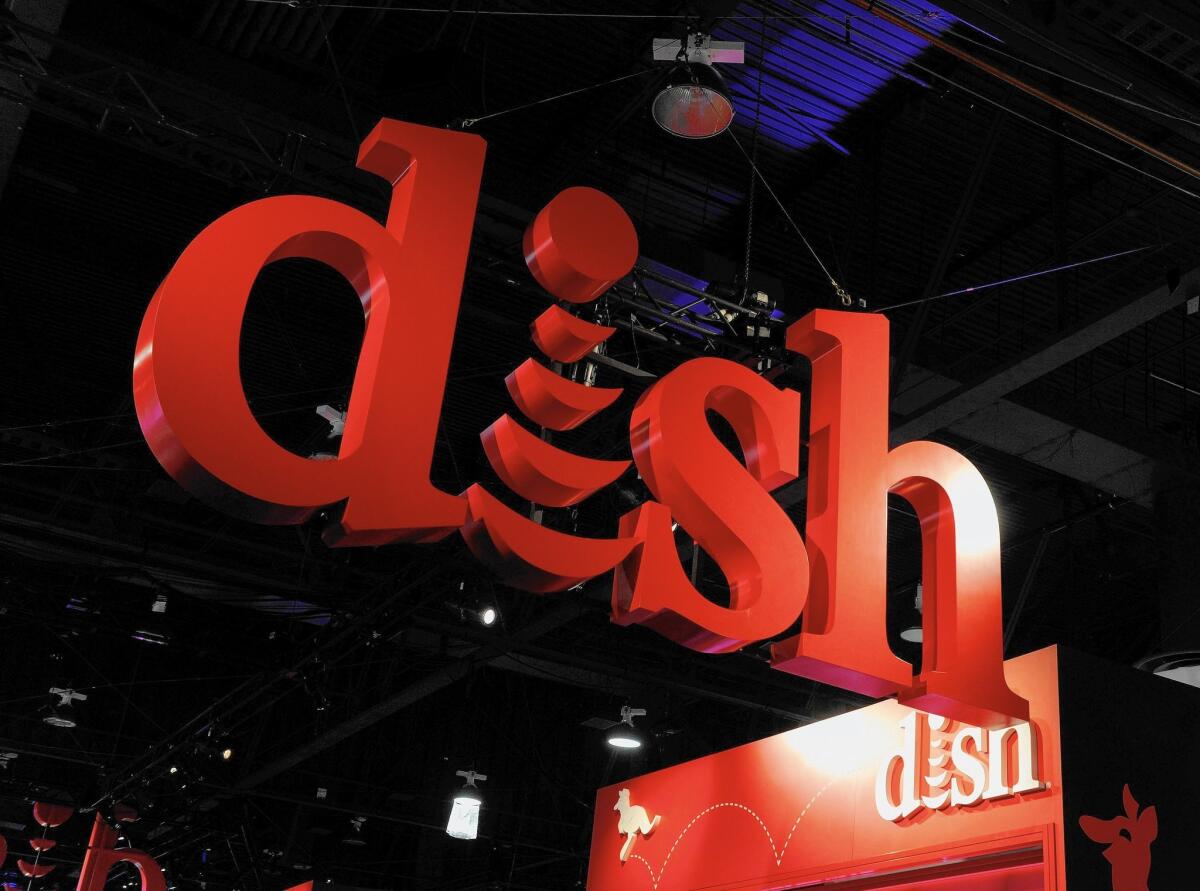Dish is in talks to acquire T-Mobile

- Share via
Satellite-TV carrier Dish Network Corp. finally may have found the merger partner it has been looking for, adding to the wave of consolidation reshaping the nation’s media and telecom industries.
The Englewood, Colo., company reportedly is in talks to acquire T-Mobile USA Inc. in a deal that would open a new vista for Dish and give T-Mobile a boost with unused airwaves that Dish owns.
A possible merger has long been a topic of speculation in an industry that is consolidating quickly to produce ever-bigger and fewer media-telecom players to compete for consumers’ thirst for broadband connections and wireless communications.
A marriage of Dish and T-Mobile, based in Bellevue, Wash., probably would be a multibillion-dollar agreement. Before trading began Thursday, Dish’s stock market value was $33 billion and T-Mobile’s was $31 billion.
Shares jumped Thursday after the Wall Street Journal reported the talks. Dish gained $3.44, or nearly 5%, to $74.25; T-Mobile rose $1.01, or 2.6%, to $39.34. Terms of a potential deal were not final and an agreement might not be reached, the Journal noted.
Dish Chairman Charles W. Ergen and his counterpart at T-Mobile, John J. Legere, certainly have been praising each other’s work in teleconference calls and separate television appearances recently.
Analysts noted that in a conference call last month, Ergen responded to speculation about a possible tie-up or partnership this way:
“As you might expect, we’re keeping all our options open, but obviously we admire what John [Legere] and his team have done at T-Mobile, and certainly we follow what they do.”
A deal would help the combined company offer a broader reach for wireless customers of T-Mobile, the nation’s fourth-largest mobile carrier. Dish, second to DirecTV in the satellite arena, acquired a big chunk of wireless spectrum in the latest auction by federal regulators.
“People’s bandwidth needs are only going to go up,” said Jeffrey Wlodarczak, chief executive of Pivotal Research Group. “Ergen is sitting on a large amount of untouched, attractive spectrum that can be used by most players in this industry.”
Even so, Wlodarczak figured that there was only a 30% to 40% chance the companies would strike a deal, in part because Ergen is a “very tough negotiator.”
“Charlie’s a poker player,” Wlodarczak said. “He’s going to want to get the full value of the spectrum, and it has been difficult for him to get deals done historically.”
Dish and T-Mobile also might simply not want to be left behind as their industries consolidate, analyst Amy Yong of Macquarie Capital said.
Amid the merger wave, “there aren’t that many options left,” Yong said. “People are partnering up left and right and it’s a process of elimination.”
The talks between Dish and T-Mobile come on the heels of other merger deals among big players in the TV, cable, Internet and wireless markets.
AT&T Inc. is in the process of buying El Segundo company DirecTV for $49 billion. Charter Communications Inc. last month agreed to acquire Time Warner Cable and Bright House Networks in separate deals totaling $67 billion.
Dish two years ago tried unsuccessfully to acquire wireless carrier Sprint Corp.
Sprint, in turn, spent much of last year negotiating to buy T-Mobile, but the talks fell apart after U.S. regulators indicated they would block the deal.
Deutsche Telekom , the German telecommunications concern that owns 66% of T-Mobile, has been looking for years to sell or merge its stake.
T-Mobile, with about 44.7 million retail customers, posted revenue of $29.6 billion last year.
Once a laggard in the wireless market, T-Mobile has been growing under Legere’s aggressive and unorthodox leadership.
Legere lowered prices, scrapped the standard two-year contracts and paid early termination fees for converts to T-Mobile. He’s also not above bad-mouthing his rivals on Twitter and elsewhere in public forums.
But a problem for T-Mobile and other wireless carriers is that the market for their core business is saturated now that nearly everyone owns a cellphone.
So carriers are seeking new opportunities outside basic wireless subscriptions, and that’s leading to industries converging.
Dish has spent billions of dollars to license space on wireless airwaves, though it hasn’t been clear how the company planned to use them. Yet buying T-Mobile would let Dish put those licenses to use without having to build a costly network of its own, analysts said.
In turn, a merger would provide T-Mobile with more wireless licenses to better compete against mobile giants Verizon Communications Inc. and AT&T.
“There’s a fit in terms of getting Dish’s spectrum used,” said Paul de Sa, an analyst at Sanford C. Bernstein & Co.
The demand for wireless continues to grow as consumers increasingly use their mobile phones to watch video on the Internet through services such as Netflix, Hulu and YouTube. That increase in usage has given immense value to Dish’s wireless holdings, analysts said.
Dish, with 13.8 million satellite-TV subscribers and 591,000 Internet subscribers, reported revenue last year of $14.6 billion. Its largest market is Los Angeles, with about 500,000 subscribers.
Times staff writer Andrea Chang contributed to this report.
More to Read
Inside the business of entertainment
The Wide Shot brings you news, analysis and insights on everything from streaming wars to production — and what it all means for the future.
You may occasionally receive promotional content from the Los Angeles Times.











